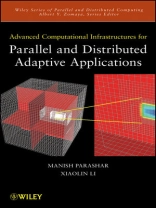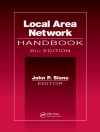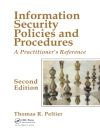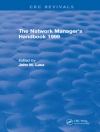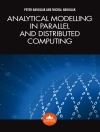A unique investigation of the state of the art in design,
architectures, and implementations of advanced computational
infrastructures and the applications they support
Emerging large-scale adaptive scientific and engineering
applications are requiring an increasing amount of computing and
storage resources to provide new insights into complex systems. Due
to their runtime adaptivity, these applications exhibit complicated
behaviors that are highly dynamic, heterogeneous, and
unpredictable–and therefore require full-fledged
computational infrastructure support for problem solving, runtime
management, and dynamic partitioning/balancing. This book presents
a comprehensive study of the design, architecture, and
implementation of advanced computational infrastructures as well as
the adaptive applications developed and deployed using these
infrastructures from different perspectives, including system
architects, software engineers, computational scientists, and
application scientists. Providing insights into recent research
efforts and projects, the authors include descriptions and
experiences pertaining to the realistic modeling of adaptive
applications on parallel and distributed systems.
The first part of the book focuses on high-performance adaptive
scientific applications and includes chapters that describe
high-impact, real-world application scenarios in order to motivate
the need for advanced computational engines as well as to outline
their requirements. The second part identifies popular and widely
used adaptive computational infrastructures. The third part focuses
on the more specific partitioning and runtime management schemes
underlying these computational toolkits.
* Presents representative problem-solving environments and
infrastructures, runtime management strategies, partitioning and
decomposition methods, and adaptive and dynamic applications
* Provides a unique collection of selected solutions and
infrastructures that have significant impact with sufficient
introductory materials
* Includes descriptions and experiences pertaining to the
realistic modeling of adaptive applications on parallel and
distributed systems
The cross-disciplinary approach of this reference delivers a
comprehensive discussion of the requirements, design challenges,
underlying design philosophies, architectures, and
implementation/deployment details of advanced computational
infrastructures. It makes it a valuable resource for advanced
courses in computational science and software/systems engineering
for senior undergraduate and graduate students, as well as for
computational and computer scientists, software developers, and
other industry professionals.
قائمة المحتويات
Preface xi
Contributors xv
Biographies xix
1. Introduction: Enabling Large-Scale Computational Science–Motivations, Requirements, and
Challenges 1
Manish Parashar and Xiaolin Li
Part I Adaptive Applications in Science and Engineering
2. Adaptive Mesh Refinement MHD Simulations of Tokamak Refueling 11
Ravi Samtaney
3. Parallel Computing Engines for Subsurface Imaging Technologies 29
Tian-Chyi J. Yeh, Xing Cai, Hans P. Langtangen, Junfeng Zhu, and Chuen-Fa Ni
4. Plane Wave Seismic Data: Parallel and Adaptive Strategies for Velocity Analysis and Imaging 45
Paul L. Stoffa, Mrinal K. Sen, Roustam K. Seif, and Reynam C. Pestana
5. Data-Directed Importance Sampling for Climate Model Parameter Uncertainty Estimation 65
Charles S. Jackson, Mrinal K. Sen, Paul L. Stoffa, and Gabriel Huerta
6. Adaptive Cartesian Methods for Modeling Airborne Dispersion 79
Andrew Wissink, Branko Kosovic, Marsha Berger, Kyle Chand, and Fotini K. Chow
7. Parallel and Adaptive Simulation of Cardiac Fluid Dynamics 105
Boyce E. Griffith, Richard D. Hornung, David M. Mc Queen, and Charles S. Peskin
8. Quantum Chromodynamics on the Blue Gene/L Supercomputer 131
Pavlos M. Vranas and Gyan Bhanot
Part II Adaptive Computational Infrastructures
9. The SCIJump Framework for Parallel and Distributed Scientific Computing 151
Steven G. Parker, Kostadin Damevski, Ayla Khan, Ashwin Swaminathan, and Christopher R. Johnson
10. Adaptive Computations in the Uintah Framework 171
Justin Luitjens, James Guilkey, Todd Harman, Bryan Worthen, and Steven G. Parker
11. Managing Complexity in Massively Parallel, Adaptive, Multiphysics Finite Element Applications 201
Harold C. Edwards
12. Gr ACE: Grid Adaptive Computational Engine for Parallel Structured AMR Applications 249
Manish Parashar and Xiaolin Li
13. Charm++ and AMPI: Adaptive Runtime Strategies via Migratable Objects 265
Laxmikant V. Kale and Gengbin Zheng
14. The Seine Data Coupling Framework for Parallel Scientific Applications 283
Li Zhang, Ciprian Docan, and Manish Parashar
Part III Dynamic Partitioning and Adaptive Runtime Management Frameworks
15. Hypergraph-Based Dynamic Partitioning and Load Balancing 313
Umit V. Catalyurek, Doruk Bozda?g, Erik G. Boman, Karen D. Devine, Robert Heaphy, and Lee A. Riesen
16. Mesh Partitioning for Efficient Use of Distributed Systems 335
Jian Chen and Valerie E. Taylor
17. Variable Partition Inertia: Graph Repartitioning and Load Balancing for Adaptive Meshes 357
Chris Walshaw
18. A Hybrid and Flexible Data Partitioner for Parallel SAMR 381
Johan Steensland
19. Flexible Distributed Mesh Data Structure for Parallel Adaptive Analysis 407
Mark S. Shephard and Seegyoung Seol
20. HRMS: Hybrid Runtime Management Strategies for Large-Scale Parallel Adaptive Applications 437
Xiaolin Li and Manish Parashar
21. Physics-Aware Optimization Method 463
Yeliang Zhang and Salim Hariri
22. Dist DLB: Improving Cosmology SAMR Simulations on Distributed Computing Systems Through Hierarchical Load Balancing 479
Zhiling Lan, Valerie E. Taylor, and Yawei Li
Index 503
عن المؤلف
Manish Parashar, Ph D, is Professor of Electrical and
Computer Engineering at Rutgers University, where he is also the
director of the Applied Software Systems Laboratory and director of
the NSF Center for Autonomic Computing. He has received numerous
awards, including the Rutgers Board of Trustees Award for
Excellence in Research (2004-2005) and the NSF CAREER Award (1999).
Xiaolin Li, Ph D, is Assistant Professor of Computer
Science at Oklahoma State University.
